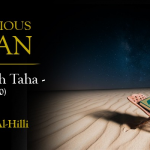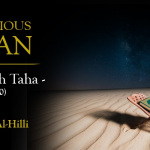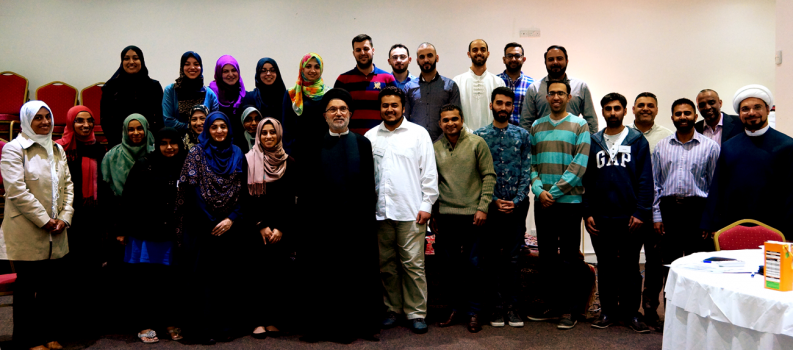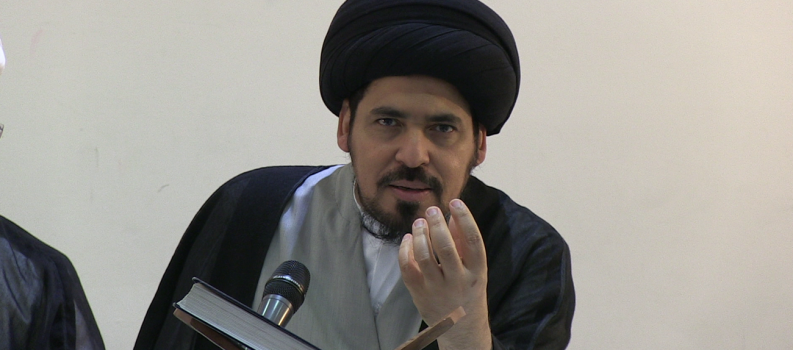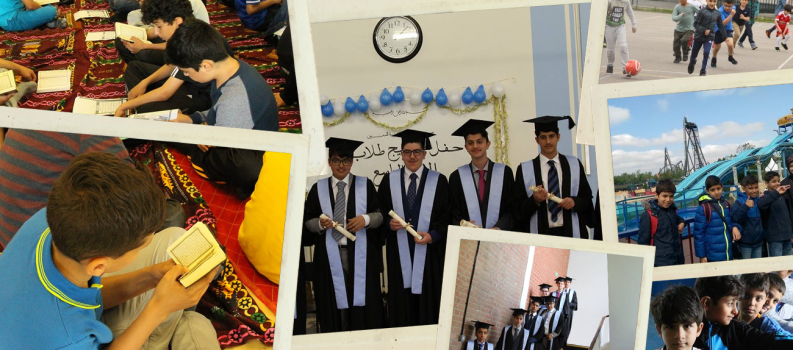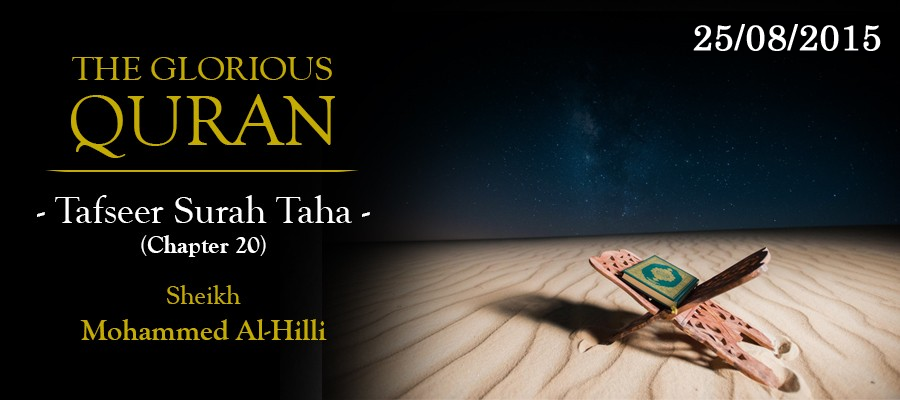
Shaykh Mohammed al-Hilli continues with his weekly tafsīr of Sūrat Ṭā Hā.
Shaykh Mohammed began by asking us to contemplate the problem of facing difficult questions. How many times have each of us been asked questions by those who oppose or disagree with us, and had difficulty answering. Though we have faith in our beliefs, we might not personally have the requisite knowledge or rhetorical expertise to successfully see off every challenge from those who seek to undermine us. In Sūrat Ṭā Hā Moses is similarly challenged by Pharaoh, who asks him: “faman rabbukumā yā mūsā – so who is your Lord oh Moses?” (20:49). One question we might ask when reading this verse is why does Pharaoh use the dual form “rabbukumā – the Lord of the two of you” (since he is being confronted by both Moses and Aaron), but then address only Moses explicitly? It has been suggested that Pharaoh has some particular connection to Moses, having brought him up, and so would consider him to be more worthy of address than Aaron, whom Pharaoh would have just seen as another Israelite slave. Moses answers: “rabbunā allaδī ‘a`ṭā kulla šay’in xalqahu θumma hadā – our Lord is the one who gave everything its creation and then guided [it]” (20:50). This particular definition of God, combining creation and guidance, can be found elsewhere in the Qur’an. For example in Sūrat al-A`lā God is described as being “allaδī xalaqa fasawwā | wallaδī qaddara fahadā – the one who created and made | and the one who destined and guided” (87:2-3). Also, in Sūrat al-Šu`arā’ Abraham describes God as “allaδī xalaqanī fahuwa yahdīn – the one who created me and so He guides me” (26:78). Opinion is divided, however, as to the exact meaning of the word “xalq” in Moses’s reply to Pharaoh. The first opinion is that it simply means “creation” and so the phrase “‘a`ṭā kulla šay’in xalqah – he gave everything its creation” simply means that God created everything. The second opinion says no, since this meaning could easily have been accomplished by using the simpler phrase “xalaqa kulla shay’ – he created everything”, but the actual phrase used is rather more involved and requires a little more exploration. Holders of this second opinion suggest that “xalq” should be interpreted in this context as meaning the substance which allows things to carry on existing, that is to say, whatever any creature needs to survive. In this sense it is connected to the principle of tasxīr, which is the idea that God has subjected things for us so that we can be sustained.
This concept is expounded upon a little in Sūrat al-Naḥl, in which we are told of God: “wasaxxara lakum al-layla wal-nahāra wal-šamsa wal-qamar – and He has subjected for you the night and the day and the sun and the moon” (16:12), and a couple of verses later: “wahuwa allaδī saxxara al-baḥra lita’kulū minhu laḥman ṭariyyan watastaxrijū minhu ḥilyatan talbasūnahā – and He is the one who has subjected the seas for you to eat fresh meat from and to extract ornaments from that you wear” (16:14). God has made so many things that we may benefit from them. In a hadith qudsi God says: “ya ibna ādama xalaqtu kulla šay’in li’ajlika waxalaqtuka li’ajlī – oh child of Adam, I have created everything for your sake, and created you for My sake” (Kalimāt Allāh, p. 169). Some have asked what the significance is of God having created us for His sake. Does this mean that God is dependent on us in some way? The answer is, of course, no. What is meant here is that we have been created so that God may love us and shower his mercy upon us, and that we may glorify and worship him. It’s not that we are necessary for God, but rather that our purpose in existing is to get closer to God. But everything else has been created for our sake, that we may be sustained by it. The bounties that God has given us are beyond number – in Sūrat Ibrāhīm God tells us: “wa’in ta`uddū ni`mata allāhi lā tuḥṣūhā – and if you tried to count God’s blessings you would not be able to enumerate them” (14:34). This is the extent to which God has provided for us in this world.
But Moses identifies God not only as the one who creates and provides for his creation, but also as the one who guides. I think we can all agree that it’s pretty pointless to put something at someone’s disposal if they don’t know how to use it. God has not only given us so much, but he gives us the guidance to utilise that which he has provided and subjected for us. This kind of guidance is known as hidāyah takwīniyyah, or generative guidance, and God has given it to all things. It’s not just mankind who utilises God’s bounties – everything is constantly sustained by this generative guidance. However there is another kind of guidance that God provides which is particular to human beings, and this is called hidāyah tašrī`iyyah, or legislative guidance. This is the guidance which governs our moral behaviour, which commands us to do good and prohibits us from doing evil. This legislative guidance has both an implicit and an explicit realisation. Implicitly it comes in the form of one’s own intellect and moral instincts, whereas explicitly it comes in the form of God’s messengers and the revealed religions. Some exegetes have added that Moses’s words “θumma hadā – then He guided” implies that every heart instinctively longs to connect with God. This idea is contrasted in Sūrat al-Raḥmān in which the phrase “fabi’ayyi ‘ālā’i rabbikumā tukaδδibān – and then which of your Lord’s blessings will you deny?” (55:13, onwards) is repeated thirty-one times. This question is asked repeatedly to demonstrate that, because of the instinctive knowledge of God we all have, we should not deny any of his blessings. As God says: “sanurīhim ‘āyātinā fi al-‘āfāqi wafī ‘anfusihim – We will show them Our signs in the horizons and in themselves” (41:53). His signs are everywhere, from the furthest horizons to within our very selves, constantly confirming the bounties he has given us. Will we then deny them?
Moses’s description of God is very beautiful and concise, encapsulating in a single sentence God’s relationship with mankind. So, having his answer from Moses, what does Pharaoh proceed to do? As before, he does not respond directly to Moses’s words, but again attempts to undermine him by deflecting the conversation. Having heard Moses’s definition of God, he asks: “famā bālu al-qurūni al-‘ūlā – then what of the previous generations?” (20:51). Exegetes have proposed three interpretations of precisely what it is that Pharaoh is asking here. The first is that he’s asking whether the people in the past who disbelieved were punished for their disbelief or not; the second is that he’s asking why there were so many people in the past who disbelieved; the third is that he’s asking about the state of the previous generations at the present, whether they are currently being punished or not. All of these three interpretations are valid and they are not mutually exclusive. Shaykh Mohammed commented that many times people find comfort when they sin in the fact that they’re not the only ones, that there are many others who are committing the same sin. They feel part of an established process and thus diminish the significance of the sin, simply taking it for granted. They feel that if most people are doing something then it can’t be that bad. There are many instances in the Qur’an, however, that tell us to be wary of what most people are doing: “‘akθara al-nāsi lā ya`lamūn – the majority of people don’t know” (7:187); “lā tajidu ‘akθarahum šākirīn – you will not find most of them to be grateful” (7:17); “akθara al-nāsi lā yaškurūn – most people are not grateful” (2:243); “wa’akθaruhum al-fāsiqūn – and most of them are sinful” (3:110); “wa’akθaruhum lā ya`qilūn – and most of them don’t understand” (5:103); “akθarahum lā ya`lamūn – most of them don’t know” (6:37); “‘am taḥsabu ‘anna ‘akθarahum yasma`ūn ‘aw ya`qilūna ‘in hum ‘illā kal-an`āmi bal hum ‘aḍallu sabīlā – or do you think that most of the hear or understand? Indeed they are like livestock, except they are more astray in their path” (25:44); “wamā yu’minu ‘akθaruhum billāh – and most of them don’t believe in God” (12:106). The overwhelming message from all of these verses is to forget about what the majority of people are doing since, just because something is done by the majority, it doesn’t mean it’s good. Sometimes we as Shi’a are attacked because we are a minority in the Muslim world, with the implication that the truth must be with the majority. But, as we have just seen, the Qur’an doesn’t accredit any value to majorities. In general the Qur’an emphasises quality, not quantity, when it comes to the actions of human beings. However, there are also instances in which we see minorities in the right: “wa qalīlun min `ibādiya al-šakūr – and few from My servants are grateful” (34:13); “wamā āmana ma`ahu ‘illā qalīl – and none believed with him except for a few” (11:40). Being in a minority doesn’t make you wrong and being in a majority doesn’t make you right. We should forget about the number of people doing something and do what is right regardless. Pharaoh, who is trying to vindicate his transgressions by invoking the vast numbers of past generations, doesn’t understand this.
Though Pharaoh’s question is not particularly germane to the matter at hand, Moses deigns to answer him, saying: “`ilmuhā `inda rabbī fī kitābin lā yaḍillu rabbī walā yansā – the knowledge of them is with my Lord; my Lord doesn’t err nor does He forget” (20:52). Moses is telling Pharaoh not to worry about past generations, since God will judge them as He judges everyone, fairly and comprehensively, and their fate does not concern him. We should pause to note how Moses now uses the form “rabbī – my Lord”. Throughout the conversation with Pharaoh he’s used three forms: “rabbik – your Lord” (20:47), “rabbunā – our Lord” (20:50) and “rabbī – my Lord” (20:52). This shifting of pronouns emphasises the fact that God is not just associated is one particular person or one particular group – He is the Lord of everyone and everything. The book Moses refers to here is identified as the Book of Deeds with which every human being will be confronted on the Day of Judgement, and Shaykh Mohammed ended by presenting us with seven qualities this books possess.
The first is that it is completely comprehensive. In Sūrat al-Kahf we are told that the wrongdoers, when faced with the book on Judgement Day, will say: “yā waylatanā māli hāδa al-kitābi lā yuġādiru ṣaġīratan walā kabīratan ‘illā ‘aḥṣāhā – Oh woes is to us! What is this book that leaves nothing out, small or big, but enumerates it all?” (18:49). It doesn’t matter how small our deeds are, they will all be placed before us in the book. The second quality is that the book will speak. In Sūrat al-Jāθiyyah God address all of mankind on Judgement Day: “hāδā kitābunā yanṭiqu `alaykum bil-ḥaqq – this is Our book, it speaks about you in truth” (45:29). The particular verb used here to mean “speak” is naṭaq, not ḥakā. Whereas the verb ḥakā could be interpreted figuratively, the verb naṭaq connotes pronunciation and implies that the book will physically speak. This last verse also gives us our third quality, which is that it will be truthful. The fourth quality is that it will be able to be read by all people in all languages. We are told that on Judgement Day every soul will be told “‘iqra’ kitābaka kafā binafsika al-yawma `alayka ḥasīban – read your book, you are sufficient against yourself as accountant” (17:14). There will be no language barrier to stop you from reading the account of your deeds. The fifth quality is that it will contain both one’s actions and one’s intentions, since this will be the book from which we will be judged, and we know from hadiths that we will be judged by our intentions as well as our deeds. The sixth quality is that the manner in which it’s given to each individual will portent how that individual will be judged. In Sūrat al-‘Inšiqāq we are told: “fa’ammā man ‘ūtiya kitābahu biyamīnih | fasawfa yuḥāsibu ḥisāban yasīrā | wayanqalibu ‘ilā ‘ahlihi masrūrā | wa’ammā man ‘ūtiya kitābahu warā’a ẓahrih | fasawfa yad`ū θubūrā | wayaṣlā sa`īrā – and when one is given his book in his right hand | so he will be judged with an easy account | and will return to his people happy | and when one is given his book behind his back | so he will cry out for destruction | and burn in a blaze” (84:7-12). Finally, the seventh quality is that the deeds it contains will be manifested. We are told of those on the Day of Judgement that “wajadū mā `amilū ḥāḍiran – they will find what they have done present” (18:49), meaning that there will be some kind of manifestation of their deeds for them to bear witness of.
Next week Shaykh Mohammed will continue looking at the conversation between Moses and Pharaoh, as Moses goes on to list some of the bounties that God has granted mankind.


